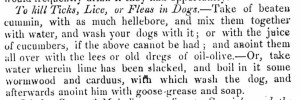We’ve been having a truly awful heatwave here in Northern California. My house is overrun with ants and I’ve been hearing half the people I know complain about sudden outbreaks of fleas (no outbreak here *knock on wood*), but it got me thinking: what did people do when there was no Advantage, no Capstar, to turn to? My books are full of dogs, and my work in progress has a housekeeper squaring off with a new wife and a puppy with fleas is a perfect fight!
Well, there is actually advice on that in multiple period sources! Huzzah!!! Research! Here’s a bit of advice from a little period magazine I own (from 1819) The Complete Dog-Fancier’s Companion, Describing the Nature, Habits, Properties, etc. of Sporting, Fancy, and Other Dogs; with Directions of choosing the genuine breed, Instructions for rearing, manner of training for water and the field, Disorders they are generally subject to, Methods of cure etc. etc. (Interspersed with many curious and entertaining anecdotes of the useful and faithful animals).
Not sure I want to rub my dog in goose-grease or olive oil, but I imagine it would do the trick of suffocating the fleas. And the cumin and hellebore might work, too. I know the organic spray I have is made of mint and cloves, which a Georgian person would also be able to easily obtain (BTW, you can download a scan of this book for your personal collection HERE).
Yet more advice from Canine Pathology, 1817.
And from A Treatise on Greyhounds (1816):
From A New Present for a Servant Maid (1771):
From The Housewifes Companion (1674)
I’m hoping a few domestic battles will be fun to write and I’m having a good time looking into just what people might have done to combat the “nimble gentry” in the Georgian era.


Great bit of info, Isobel. Thanks. I often wonder what Regency people did about common problems we deal with so easily. As for fleas remember “the best is cleanliness” — my favorite line. Does that later line translate “where there are SLUTS? there will be many fleas” Did “slut” mean something different then than now?
I wondered the same thing! Haven’t had a chance to research it yet.
Ok, yes. Quick etemology check shows it also meant a “woman with low standards of cleanliness.” So yes, where there were sluts, there would probably be fleas!
I have that mint and clove spray, too. I think it’s by Out. I got it at Walmart. It helped kill the fleas on the carpet. It did reduce our fleas. We have cats. First we had ants then the fleas. Also gnats. Bugs get into old houses easily.
Ack! My sympathies on the ants and hope the fleas stay away.
Thanks for all the tidbits. I’m always interested to learn that what we may think of just as herbs or seasonings can have practical and/or medicinal applications.